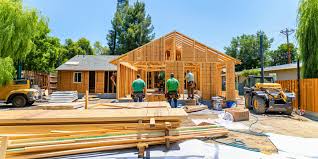Home renovation is more than just a trend – it’s an opportunity Residential and Commercial Renovations to transform a house into a personalized sanctuary, improve functionality, and boost property value. Whether you’re updating a few rooms or embarking on a complete overhaul, the process can be both exciting and overwhelming. It requires careful planning, creativity, and investment. In this article, we’ll explore the essential aspects of home renovation, from understanding the purpose to tackling the challenges and reaping the rewards.
Why Renovate Your Home?
Renovation serves many purposes. Some homeowners may need to update outdated or worn-out spaces, while others may seek to make their homes more comfortable and modern. Below are some common motivations for starting a renovation project:
- Improved Functionality: Over time, a home’s needs can change. Growing families might need extra bedrooms or more spacious living areas, while empty nesters may desire to downsize. Renovations allow you to reconfigure your space to meet these changing needs.
- Increased Property Value: Renovations are one of the most effective ways to increase the resale value of a home. Modern kitchens, upgraded bathrooms, or creating open floor plans are all appealing to potential buyers.
- Aesthetic Updates: Whether it’s giving your living room a facelift with fresh paint and new flooring or transforming a bathroom into a spa-like retreat, renovations help you express your personal style and breathe new life into your home.
- Energy Efficiency: Many homeowners renovate to make their homes more energy-efficient. Installing new windows, insulation, or energy-saving appliances can help lower utility bills and reduce your carbon footprint.
Key Renovation Areas
While every home is unique, some renovation projects tend to offer the most value and enjoyment. Let’s take a closer look at the most common renovation areas:
- Kitchen Remodel: Often referred to as the heart of the home, the kitchen is one of the most used spaces in any household. A kitchen renovation can vary from replacing outdated appliances to a complete redesign with new cabinets, countertops, and modern technology like smart fridges or energy-efficient ovens. Open shelving, updated lighting, and a fresh coat of paint can also make a huge difference.
- Bathroom Remodel: Bathrooms, like kitchens, can be transformed into luxurious retreats. Popular upgrades include walk-in showers, soaking tubs, heated floors, and sleek fixtures. Adding storage, improved lighting, and stylish tiles can elevate the overall ambiance.
- Basement and Attic Conversions: Unused spaces such as basements and attics are excellent opportunities for renovation. Transform a dark, underutilized basement into a cozy living room, office, or guest suite. Attics can be turned into a private bedroom or even a home gym.
- Living and Dining Areas: These spaces are where families gather and entertain. Removing walls to create open-plan living areas can make a home feel more spacious and welcoming. Installing larger windows for better natural light or adding built-in shelves for storage can enhance both aesthetics and practicality.
- Exterior Upgrades: Curb appeal plays a significant role in a home’s first impression. Renovating the exterior, such as painting the facade, adding new landscaping, or installing a stylish front door, can boost the home’s appeal and provide instant satisfaction.
Steps to a Successful Home Renovation
Starting a home renovation project can seem daunting, but breaking it down into manageable steps can ensure success. Here’s how to approach it:
- Set a Budget: Before you even start thinking about design, it’s essential to set a clear budget. Renovations can get expensive, and costs can spiral out of control without proper planning. Consider not just the materials and labor, but also unexpected costs that may arise.
- Define Your Goals: What do you want to achieve with your renovation? Are you looking to increase space, improve efficiency, or make your home more modern? Write down your goals and prioritize them.
- Hire the Right Professionals: While DIY projects can be satisfying, hiring experienced professionals can make a significant difference in the quality of the renovation. Whether it’s a contractor, designer, or specialized tradesperson, make sure you hire reputable experts who have experience with your specific type of renovation.
- Get Permits and Approvals: Depending on the scope of your renovation, you may need permits from your local government. Always check your municipality’s requirements before starting major work, as failing to do so can result in fines or complications later on.
- Prepare for Disruption: Renovations can be messy and disruptive, especially if you are living in the home during the process. Consider your temporary living arrangements and prepare to adjust your daily routine.
- Stay Flexible: Sometimes, things won’t go as planned. Materials may be delayed, or unexpected structural issues may arise. Being adaptable will help you navigate the challenges that come with a renovation.
Sustainability in Home Renovation
In recent years, many homeowners are prioritizing sustainability in their renovation projects. Environmentally conscious renovations not only contribute to reducing your carbon footprint but can also result in long-term savings. Here are a few sustainable renovation ideas:
- Energy-Efficient Windows and Doors: Upgrading to energy-efficient windows and doors can help with temperature control and save money on heating and cooling.
- Low-VOC Paints: Volatile organic compounds (VOCs) found in paints can be harmful to the environment and your health. Choose low-VOC or VOC-free paints to make your home safer and more eco-friendly.
- Solar Panels: Adding solar panels can help reduce energy bills and lower your home’s reliance on traditional energy sources. Although the initial investment can be high, solar panels can provide long-term savings and even increase property value.
- Recycled Materials: Use recycled or upcycled materials for furniture, cabinetry, or flooring. This not only helps reduce waste but can also add unique character to your home.
Conclusion
Home renovation is a powerful way to rejuvenate your living space, reflect your personality, and enhance the functionality of your home. With the right planning, budget, and professionals, you can transform your home into a more comfortable, efficient, and aesthetically pleasing place to live. Whether you’re investing in small updates or undertaking a complete transformation, a well-executed renovation has the potential to improve your quality of life and provide a strong return on investment.
Remember, the key to a successful renovation lies in preparation, creativity, and staying flexible in the face of challenges. Happy renovating!



